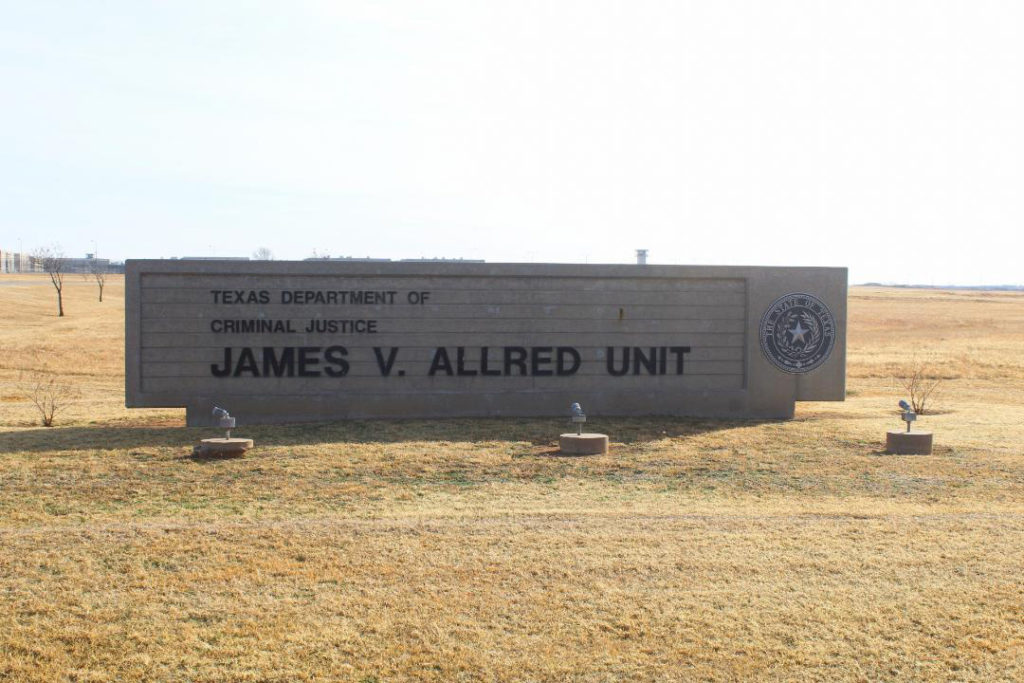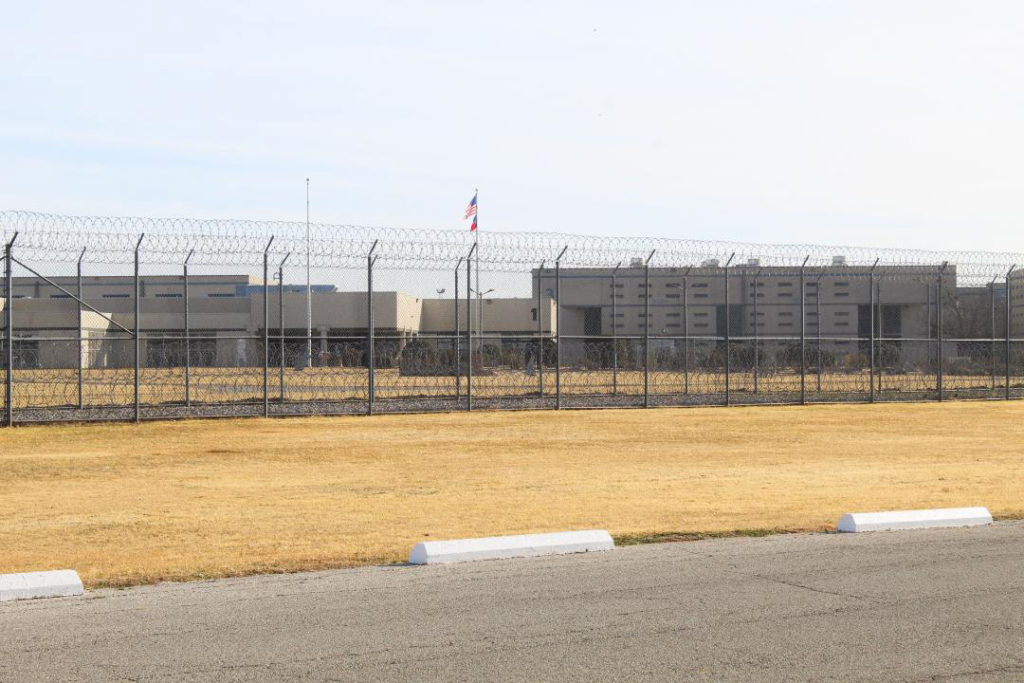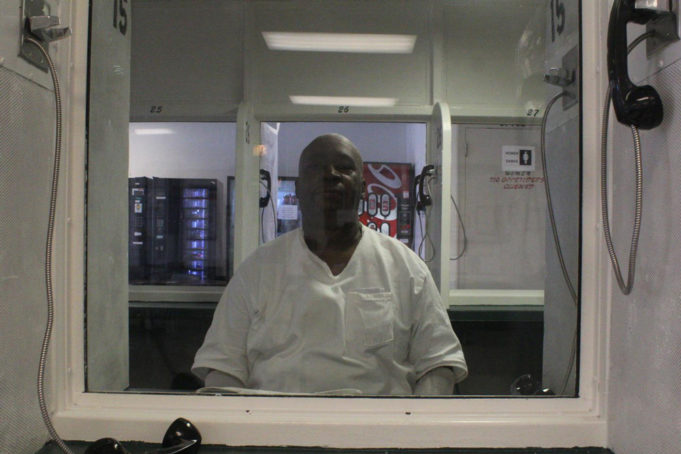For the past few months, I have received near daily letters from Ronnie Turner, a Black man in his late 50s who claims that he was wrongfully convicted of aggravated robbery of a Fort Worth convenience store 18 years ago.
The dozens of letters and large envelopes that greeted me every day as I returned from work were packed with government documents, court records, and pointed letters that describe what appeared to be a weak case that Tarrant County prosecutors used to incarcerate him.
I recently made the two-hour drive to the James V. Allred Unit just north of Wichita Falls to meet Turner. After passing a rapid COVID test inside, I was searched and led to a long row of cubicles separated by glass. A media relations staffer with the Texas Department of Criminal Justice was on hand to brief me on the rules of the interview. I was not allowed to bring my wallet or smartphone and was allowed only one hour with Turner.

Photo by Edward Brown.
Behind the glass was a gentle-looking man of medium build with closely cropped white hair. Rather than wait for questions, he launched into a calm and deliberate description of his case and subsequent attempts to appeal his conviction. It was clear that he had come prepared.
“I have lost everything,” he said. “I’ve been gone 18 years for a crime I didn’t do. I have lost my son. I have lost my older brother. I am now divorced because of this case. What I have lost, no one can ever give back. I have the evidence and trial transcripts, and these people don’t care.”
He broke down sobbing.
“My mama is about to die,” he continued, still choking up. “My mom is about to go home in heaven. I’m trying to go home before she dies.”
At every point in the local criminal justice system, Turner alleges he has found corruption and a concerted attempt to derail his appeals. The most recent effort, he said, is a citation by the Texas Court of Criminal Appeals for abusing the state’s appeal process.
“It is obvious from the record that the applicant continues to raise issues that have been presented and rejected,” one recent letter reads. “Because of his repetitive claims, we hold that the applicant’s claims are barred from review. This application is dismissed.”
A spokesperson for the court of appeals ignored multiple requests for comment on this story. The state courts, Turner said, are trying to stop evidence from coming to light, evidence that he is innocent and wrongfully convicted. In a recent letter, Turner told me that Tarrant County’s clerks have withheld documents, including three alibi witness statements from his longtime girlfriend, that were supposed to be forwarded to the district attorney’s office.
Tarrant County’s conviction integrity unit, Turner claims, is a fraud. According to the county website, the unit that is headed by county prosecutors is tasked with reviewing claims of innocence and systemic issues that lead to wrongful convictions.
As recently as October, integrity unit attorney Andrea Jacobs filed a notice with the county clerk’s office that states that the DA’s office “does not intend to file a response” to Turner’s request for an investigation into his case.
A spokesperson for the DA said in an email that their office has responded to Turner’s claims several times in the past.
“Most recently, this office provided an 11-page response to his” actual innocence claim, the spokesperson continued. “We will not respond to [his most recent appeal] because it was rejected in 2021 by the Court of Criminal Appeals. As for our conviction integrity unit, they reviewed his complaints in 2017 and were unable to substantiate any claims he raised.”
The post-conviction process is set up to fail, said Mike Ware, executive director of Innocence Project of Texas (IPTX), a nonprofit that works to overturn wrongful convictions.
For every exonerated Texan, there are likely 10 Texas prisoners who have not been exonerated due to the onerous exoneration process, a lack of access to legal help, or a combination of those factors, he said. IPTX estimates that, at any given time, upwards of 9,000 wrongfully convicted Texans remain in prison.
*****
On July 16, 2004, Fort Worth police officer Robert Ellis responded to a 911 call from 7020 W. Vickery Ave. at 10:16 a.m., according to police records. By 10:20 a.m., Ellis was on the scene at the Quick Mart on the West Side. Police documents describe what happened next.
“At approximately 10:05 a.m., the suspect entered the store and walked to the beer cooler and got a 12-pack of Coors Light bottles. The suspect placed the 12-pack of beer on the counter. As the [employee] began scanning the beer, the suspect states, ‘Money, money.’ The suspect was holding a small black revolver. The [employee] pulled the cash till out of the drawer, and the suspect took it and walked out of the store. The suspect also took the beer.”
Cesar Salinas, according to the police report, observed the suspect prior to the offense, washing his car at a nearby facility. The suspect walked into the Quick Mart wearing a white tank top, blue shorts, and, on his head, a dark-colored bandana. One minute later, Salinas said he witnessed the suspect leave the Quick Mart with a 12-pack of beer and the till held close to his chest. The suspect then drove away eastbound on West Vickery Avenue.
Witness Ketsana Mehra was standing by the freezer and “briefly saw the suspect leaving.” Witness Etsuko LaFleur similarly saw the suspect briefly, according to the police report.

Photo by Edward Brown.
At 9:30 p.m., officers arrested Turner, who was driving a vehicle that matched the one used at the Quick Mart robbery. Police interviewed him before taking him to the Fort Worth police jail at 350 W. Belknap St.
Turner told me during our prison interview that he was shopping for a birthday cake for his daughter at the time of his arrest.
In a supplemental report filed four days later, police say that witness Saroj Mehra said she did not look at the suspect’s face. Police showed Salinas a photo spread of male headshots soon after the crime was committed. He pointed to a photo of Turner and said, “That’s him.”
A police search of Turner and his vehicle failed to uncover any evidence that tied him to the crime earlier that day, according to the police report and subsequent court testimony. Turner’s bond was set at $150,000.
The district attorney’s case against Turner, which began 16 months later, relied on eyewitness testimony and Turner’s green Grand Am, although the eyewitness descriptions of the car varied and often did not describe the four-door Grand Am without tinted windows that Turner was driving when he was arrested.
One witness, Ketsana Mehra, stated during the criminal proceeding that prosecutor Richard Bland had told her where Turner would be sitting, according to court transcripts. I attempted to contact Bland, but the State Bar of Texas lists him as deceased.
In the transcripts, the court reporter describes the following late-2005 trial testimony that includes quotes from prosecutor Bland and defense attorneys Doug Emerson and Rex Barnett. Although Ellis was the initial officer on the scene following the burglary, several officers later joined the investigation and testified in court.
Defense attorney Barnett: When you were speaking to Mr. Bland before the trial, were you told where everybody would be sitting in the courtroom?
Ketsana Mehra: Was I told that? [Prosecutor Bland] told me, “He was going to be sitting there. You sit there, and [Turner] sits there.”
Barnett: Is Mr. Turner the only Black person at the table?
Mehra: Yes.
Turner told me he was the only Black man sitting at the table and that Bland’s documented coaching made it all but certain that she would be able to point to Turner during the trial. Earlier during that court proceeding, one officer assigned to the case said Ketsana Mehra had previously stated that she did not see the suspect clearly on the day of the robbery. Defense attorney Emerson questioned the credibility of Ketsana Mehra as a witness.
Emerson: In reference to Ketsana Mehra, she was also in the store when this occurred?
Police officer: Yes.
Emerson: She was not able to make any kind of identification either?
Officer: No, sir. I don’t believe so. I don’t believe she saw his face at all.
Etsuko LaFleur also testified against Turner even though an officer described her as a weak witness at best.
Officer: [LaFleur] advised that she didn’t have much detail to give me on this. She stated she was positive she could not ID him at that time.
Defense attorney Emerson: Was she shown a photo spread?
Officer: No, sir. She said she couldn’t pick him, so I didn’t show her the [photo] spread.
Witness Saroj Mehra, the female employee who was held at gunpoint, testified that Turner was “maybe” the man who robbed the store.
Prosecutor Bland: Do you see the person that robbed you in the courtroom today?
Saroj Mehra: Maybe he is the one.
Bland: Pardon?
Mehra: Maybe he is the one.
Bland: Maybe him?
Mehra: He is the one.
The prosecution’s strongest witness by far was Cesar Salinas, the man who said he saw the suspect three times during the day of the robbery and whose 2004 photo spread identification led to Turner’s $150,000 bond and warrant for aggravated robbery. Salinas testified last. At the time of the trial, Turner was 40 years old.
Defense attorney (unnamed): How was [the robber] dressed?
Salinas: Dressed in appropriate manner of a 20-, 22-year-old with the long shorts that they use and a sleeveless shirt and wearing like a handkerchief or a bandana.
Defense attorney: Would you recognize that individual if you saw him here in the courtroom today?
Salinas: I possibly could, but then it’s been 16 months.
Bland: When you saw the photo spread [on July 16, 2004], did anyone tell you that you had to pick someone out?
Salinas: No, just showed me the pictures to see if I could identify [the suspect], and I told them which one it was.
When asked if the photo of Turner’s car matched the one from the crime scene, Salinas said he wasn’t sure because he couldn’t see the side windows on the photos that prosecutors presented in court. Turner alleges that the photos of his car were purposefully taken only from the front and back. Turner’s car did not have tinted windows, but several witnesses said the robber left in a car with tinted windows.
Toward the end of the trial, Turner’s defense team made an impassioned plea to the jury to find Turner not guilty of aggravated robbery.

“At the core of the system is that no person can be deprived of their liberty, one of the most important rights we have in this country, without appropriate safeguards,” defense attorney Barnett said. “They cannot be imprisoned by mere accusation or conjecture or wishful thinking. As a society, we do not want lawbreakers to get away, but it is so much more important to make sure that the wrong person doesn’t pay for what someone else does. It must be beyond a reasonable doubt. This is a case where we do not have any forensic evidence, no fingerprints, no DNA, no hair clippings, nothing physical linking anybody to the crime. We don’t have pictures of the crime. We had cameras in the store, but, for whatever reason, it wasn’t working that day.”
Barnett and Emerson practice law in Pittsburgh and Weatherford respectively, according to the State Bar of Texas. Neither attorney responded to my requests for comment on this story.
Turner said that he did not testify because he did not want the prosecution to ask about his previous criminal record for unarmed burglary and unlawful carry of a weapon.
“I do truly regret the things that I have done in the past and any harm that I have done,” Turner told me via letter, referring to offenses he committed between 1983 and 2004.
Barnett made one last appeal to the judge to issue what is known as a directed verdict. The ruling allows a judge to order the jury to return a verdict in favor of the party that requests the directed verdict.
“There has been insufficient evidence on the identity of the defendant except for contrary and contradicting testimony from the witnesses,” the defense said.
Defense motion for directed verdict is denied, Judge Elizabeth Berry replied.
*****
Turner alleges that the county clerk’s office, the DA, local criminal judges, and the Texas Court of Criminal Appeals are coordinating efforts to derail his and other claims of actual innocence.
“Five times I have filed my actual innocence claim with DA Sharen Wilson,” Turner said. “Despite the affidavits from my alibi witness Jennifer Pullins putting me at her home at the time of the crime, the discrepancies surrounding the vehicle, and the misidentification that was allowed to happen in open court, Sharen Wilson and assistant district attorney Andrea Jacobs refuse to file any response in my case with the court.”
Turner maintains that a 2018 sworn affidavit that was signed by Pullins, his girlfriend at the time, should have been proof enough to open an investigation into his trial and conviction. In the affidavit, Pullins said she was with Turner at the day and time of the convenience store robbery. When Pullins called the assistant district attorney heading the conviction integrity unit at the time, Pullins was told to stop calling, according to the affidavit.
I asked Pullins how Turner’s conviction has affected her.
“We just write to each other,” she said. “We still talk about getting married.”
Fighting back tears, Pullins said that she still prays for his release or exoneration.
“He is innocent,” she said. “He didn’t do that stuff. He was a hardworking man. They just lie about him.”
The charge of aggravated robbery, she said, doesn’t fit his demeanor, she said.
“He wasn’t that kind of person,” she said. “No, he never got angry. He was a very good guy. He is a very good person.”
Turner feels the police, the DA, and the criminal judge destroyed his life.
“There is no way in hell that I would trust an attorney in Tarrant County to do my writ of habeas corpus,” Turner wrote in one of his letters, referring to the legal procedure for seeking exoneration. “They are all friends, and any attorney would rather lose than expose corrupt officials.”
With Pullins’ affidavit, Turner said he is entitled to an evidentiary hearing. Assistant district attorney Jacobs has denied that due process, Turner said. He said an investigator with the conviction integrity unit did speak to Pullins a few years ago but did not follow up.
“Ronnie Turner was at my apartment with me, and he didn’t get up until 1 p.m. or 1:30 p.m.,” Pullins wrote in one affidavit. “He left my apartment about 5 or 5:30 on July 16th to give a friend a ride home. I told Ronnie that I would come to court and testify to this at his trial. However, at no time did I ever hear from Ronnie’s attorneys or from the Fort Worth police detective or district attorney’s office. Had they contacted me, I would have been to court to testify as a witness to his whereabouts on July 16. I believe that with my testimony, Ronnie would not have been convicted.”
A DA spokesperson sent me court documents that show that prosecutors did not find Pullins’ affidavit to be credible. In court documents, prosecutors allege that Pullins did not sign the first of the three sworn letters that she sent to the DA’s conviction integrity unit on Turner’s behalf and that the other signatures were suspect. Prosecutors also point toward the timing of Pullins’ written testimony.
“In applicant’s prior 14 applications, he alleged that he was actually innocent several times but never alleged that Ms. Pullins was his alibi,” part of a court document reads.
Turner said that the continual roadblocks that he faces with the DA, county clerk, and state court of appeals are designed to protect prosecutor Bland and Judge Berry from respectively facing charges of prosecutorial and judicial misconduct. Turner was unaware of Bland’s death at the time of our interview. Court documents from the trial show that Turner’s previous team was unaware of Pullins or her ability to testify as an alibi witness, and it is unclear why she was not contacted to testify in Turner’s 2005 trial.
Reporting by the Washington Post found that wrongful convictions are often the result of official misconduct. Citing a recent report by the National Registry of Exonerations, a project managed by three universities, reporters found that prosecutor misconduct was responsible for 30% of wrongful convictions, yet only 4% of prosecutors involved in those convictions were disciplined.
The study cites five types of misconduct that lead to wrongful convictions: misconduct in interrogations, witness tampering, fabricating evidence, concealing evidence that weakens prosecutors’ cases, and misconduct at trial.
“Misconduct by police, prosecutors, and other law enforcement officials is a regular problem,” Samuel Gross, co-founder of the registry, told the Washington Post. “It produces a steady stream of convictions of innocent people.”
Since 1989, the National Registry of Exonerations has documented 2,946 exonerations. One local Black man was recently released from prison after lawyers with IPTX used new DNA mapping techniques to conclude that he did not hold the gun that killed a Fort Worth club owner in 2009. The released man, Willie Thomas, was convicted in 2011 and given a life sentence without the possibility of parole.
Thomas’ conviction was largely based on statements from two men, referred to in court documents by their last names only, Morgan and Odom, who were involved in the robbery that led to the club owner’s death. As part of a plea bargain that lowered their sentences, they agreed to testify against Thomas.
“Witnesses at the club were not able to positively identify Thomas as being present at the crime,” a public statement by IPTX read.
Inmates are often given full exonerations following the discovery of new DNA evidence, but the local DA’s office is requiring Thomas to undergo a retrial.
Since 2006, staffers with the Innocence Project of Texas have worked to exonerate or free 25 innocent people who collectively served 341 years behind bars. Ware and his Innocence Project team sift through around 1,000 credible letters every year from incarcerated Texans seeking to overturn their convictions.
“The system was supposed to prevent wrongful convictions in the first place, but it hasn’t always worked out that way,” Ware said. “Other than the very general right of habeas corpus, there is nothing specifically in the Constitution that says someone who has been wrongfully convicted has a right to be exonerated. The Supreme Court has had many opportunities to say that it is a violation of due process for an innocent person to be convicted, incarcerated, and even executed, but they are yet to recognize that as a due process violation.”
Ethnic minorities and the poor are often victims of wrongful convictions because those populations are easier for law enforcement to pick on, Ware said. Another reason that this country frequently convicts the innocent, he continued, is because our solution to everything is to criminalize acts and prosecute them.
“If you convict a large number of people, a proportionally large number of them are going to be innocent,” he continued. “Many wrongful convictions involved an eyewitness who inaccurately pointed to a defense table and said, ‘That’s the person who did it.’ That’s very unreliable testimony, but it is very convincing testimony to a jury. A major cause of inaccurate eyewitness testimony, aside from the infirmities of the human perception and memory, is the fact that it’s coached. The police and the prosecutors know what they need that person to say to get a conviction, so they tell them what to say, and most witnesses will adhere to what the ‘authorities’ tell them to do, even if they believe it to be wrong.”
Ware is advocating for a set of proposals currently before the State Bar of Texas’ Committee on Disciplinary Rules and Referenda that would compel prosecutors to disclose evidence that proves a person was wrongfully convicted.
As Turner’s prison interview ended, he asked that I promise to send him a copy of my story when it came out and to send additional copies to the governor, state attorney general, and new candidates for the DA’s office. He was heartened to learn that DA Sharen Wilson will not seek reelection in 2022.
DA Wilson’s reputation remains tarnished from the 2018 conviction of Crystal Mason, a Black mother of three, for illegally voting. Mason was on supervised release following a tax fraud conviction when she cast a ballot in 2016. Mason maintains that she was unaware of the obscure law that prohibits certain people from voting while under specific types of federal probation. The case is being appealed by the ACLU, which maintains that DA Wilson is using the conviction to fuel right-wing paranoia over voter fraud as a means of justifying Republican voter suppression laws.
More recently, Wilson’s administration has been plagued by accusations that her office put the interests of wealthy Southlake Republican donors over the people of Tarrant County. Early last year, Wilson sought the unprecedented prosecution of two Carroll school board members for alleged violations of the Texas Open Meetings Act, a state law governing board meetings that is frequently violated by political allies of Wilson. The indictments served the stated interests of prominent Republican donors, including current county judge candidate Tim O’Hare, who see maligning public schools as a means of furthering baseless Critical Race Theory conspiracies and further disenfranchising people of color.
DA Wilson “stated that she was going to create the [conviction integrity unit] when she campaigned,” Turner said. “She won. She publicized one case. It was a Black guy. They found a fingerprint. He was in prison for 19 years. It took 19 years to bring that up? That is the only case I have heard of.”
The DA’s office has not yet responded to my open records request seeking the number of wrongful convictions that have been overturned by the conviction integrity unit. A cursory search for past news coverage found that John Nolley, a Black man, was released through the work of IPTX and the local conviction integrity unit in 2018, and Aaron Dyson, who is white, was released last year after prosecutors reviewed new evidence related to his case.
I gave Turner my word that I would forward copies of the story as requested and that I would share the details of the case with the Innocence Project of Texas and the shortlist of elected officials he requested by name.
“Please expose them,” he said. “The people of Tarrant County need to know.”
This article has been updated to include a corrected figure by the National Registry of Exonerations.












